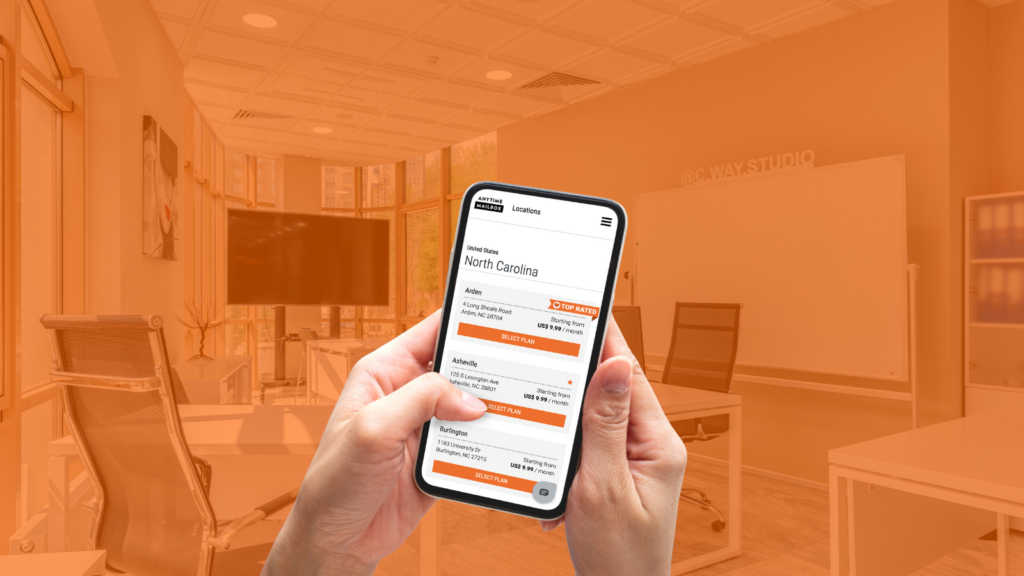Are you puzzled about the legality of virtual addresses in the USA? In compliance with specific criteria, “Is a virtual address legal in the USA?” – the answer is yes, virtual addresses are indeed legal for both personal and business use. This article explores the requirements and regulations you must adhere to, distinguishing between virtual and P.O. box addresses, as well as highlighting the implications for businesses and banking.
Key Takeaways
- Virtual addresses are legal in the USA and can be used by businesses to maintain a professional presence without the cost of a physical office, but they must comply with USPS and state regulations including registering as a CMRA and not using P.O. boxes for business registration.
- A virtual address provides privacy, a professional image, and operational benefits like mail forwarding, and differs from P.O. boxes which have limitations for businesses, such as not being acceptable for official business registration.
- For LLCs and corporations, virtual addresses are legitimate for business operations and registration purposes when used correctly, including meeting requirements like having a registered agent service and complying with specific state regulations.
Virtual Addresses and Their Legality in the USA

The question is straightforward, yet vital for any business considering a shift from brick-and-mortar to digital: Are virtual addresses legal in the USA? The answer is a resounding yes.
- Virtual addresses are not only legal, but they also present an innovative solution for businesses looking to establish a professional presence without the overhead of a physical location.
- However, it’s not a free-for-all. To utilize a virtual address legally, businesses must navigate a series of regulations laid out by the United States Postal Service (USPS) and individual state governments.
- The digital era has ushered in a new wave of business practices, and virtual addresses are at the forefront of this revolution.
- Virtual addresses offer a flexible and cost-effective option for entrepreneurs, freelancers, and companies to maintain a prestigious business front while enjoying the freedom to operate from anywhere.
- This modern approach to business addresses is transforming the traditional office setup, allowing for a virtual office space that can be tailored to the dynamic needs of today’s businesses.
- Maintaining compliance is paramount, given that a virtual address does more than just receive mail. It also serves as a beacon for your business’s identity.
- Whether you’re a burgeoning startup or an established enterprise, using a virtual address professionally requires knowledge of the regulatory landscape.
- Virtual address services must be duly registered with the USPS, and they are bound by federal laws to protect privacy and handle mail responsibly.
- A virtual mailbox, or virtual address, is a blend of convenience and legal foresight that ensures businesses can confidently use virtual addresses as a legitimate base for their operations.
Federal Regulations
At the federal level, the USPS plays a gatekeeping role, ensuring that virtual address services operate within a framework of trust and legitimacy. Any provider offering virtual address services must:
- Register as a Commercial Mail Receiving Agency (CMRA), which is a necessary step for any business offering virtual address services.
- This registration is a declaration of legitimacy, indicating that the service provider is recognized by the USPS and is authorized to handle mail on behalf of others.
- Adhere to stringent guidelines set forth by the USPS, which are designed to maintain the integrity of the mailing system.
- These guidelines ensure that virtual address providers operate in a manner that is secure, reliable, and respects the privacy of their clients.
- Secure proper authorization to receive mail on behalf of their clients, which involves completing USPS Form 1583 and providing two forms of identification.
- This process is a critical part of the trust between a virtual address service and its clients, as it confirms that the provider is permitted to manage and handle the mail directed to the businesses that utilize their services.
- This system is designed to safeguard and ensure each piece of mail and legal document securely reaches its rightful owner.
State Regulations
While federal regulations provide a uniform starting point, state regulations introduce a tapestry of requirements that can vary dramatically.
- Some states welcome virtual addresses with open arms as official business addresses, while others set boundaries, such as requiring a registered agent service, or outright prohibiting P.O. boxes for business registration.
- Keeping up with these regulations is not just beneficial, it’s necessary given the potential for business registration and licensing rules to fluctuate.
- Also, it’s not solely about legality, but also about firm establishment of your business where a permanent business address takes precedence over a residential one due to concerns from privacy to liability.
- A virtual address serves as a stable cornerstone for your business identity, enhancing credibility with clients, partners, and regulatory bodies alike.
- It’s a strategic move that underscores the professionalism and permanence of your enterprise, despite the transient nature of the digital world.
- A virtual address can significantly reduce the risks associated with using your home address for business purposes, such as exposing your personal space to security breaches or legal issues.
The Difference Between Virtual Addresses and P.O. Boxes

Distinguishing between a virtual address and a P.O. box is akin to differentiating a smartphone from a landline—a matter of functionality and perception.
- A virtual address is tied to a physical office space, lending credence and a professional vibe to your business pursuits.
- In contrast, a P.O. box, while useful, lacks the gravitas of a real street address and comes with its own set of limitations for business use.
- A virtual address offers the unique combination of a physical address with the convenience of digital mail management.
- This means not only a professional front but also the flexibility of services like mail forwarding and online mail management tools, which aren’t available with a traditional P.O. box.
- With a virtual mailing address, you can enjoy the best of both worlds.
Accessibility and Professionalism
The allure of a virtual address lies in its ability to project a polished and professional image.
Picture this: Your business card boasts an address in a dynamic business district, instantly elevating your brand in the eyes of clients and partners. This is the power of a virtual address.
- It provides the impression of a physical presence, a hallmark of stability and permanence, without the associated costs of a physical office.
- Furthermore, choosing a virtual address offers the following benefits:
- Safeguards your privacy and avoids the confluence of your personal and professional lives, ensuring that your home remains a sanctuary away from work-related intrusions.
- No need to publish your home address in public directories, thereby maintaining anonymity and preventing unwanted solicitations or visits.
- Serves as a secure and professional point of contact for all business correspondence, enhancing the perception of your business and contributing to a more established and trustworthy image.
Legal Restrictions for P.O. Boxes
The limitations of P.O. boxes become apparent when it comes to the official and legal side of running a business.
- A P.O. box cannot stand as a physical address for business registration, primarily because it doesn’t facilitate the reception of official government communications, such as legal notices or tax documents.
- A virtual address, on the other hand, not only allows you to receive postal mail from the government but also ensures that your business mail is handled with the care and confidentiality it deserves.
Benefits of Using a Virtual Address for Your Business

- The advantages of embracing a virtual address include:
- Privacy
- Professionalism
- Cost-efficiency
- Operational flexibility
- These benefits are important to any savvy business owner.
- In a landscape where a first impression can make or break a deal, a virtual address can be the ace up your sleeve, giving your business the competitive edge it needs.
Privacy and Security
In a time when personal data holds as much value as money, privacy and security are more than just trending terms, they are vital business considerations.
- A virtual address acts as a shield, keeping your personal mailing address out of the public eye and mitigating the risk of unsavory characters having access to your private information.
- It’s a layer of separation that safeguards your personal assets from business liabilities, giving you peace of mind that your business dealings won’t spill into your personal sanctuary.
- Moreover, the security protocols of virtual mailbox services, which often include encryption and secure storage facilities, are designed to ensure that your business communications are only accessed by authorized eyes.
Cost Savings
In terms of saving money, virtual addresses present a compelling economic story.
- By eschewing the traditional office space and opting for a virtual business address, you eliminate not just the rent but also the cascade of expenses that accompany a physical location, from utility bills to furniture and beyond.
- A virtual address negates the need for on-site staff to manage mail and packages, which can result in staffing cost reductions.
- Insurance costs, which are a staple for physical offices, can also be trimmed down or eliminated.
- The cost savings from using a virtual address can be channeled into growing the business, investing in marketing, or simply boosting your profit margins.
Flexibility and Expansion
Another key benefit of virtual addresses is flexibility.
- Whether you’re a small business owner seeking to test the waters in a new city or a seasoned entrepreneur aiming for global reach, multiple virtual business addresses make expansion less of a leap and more of a strategic step.
- The beauty of a virtual mailbox service is that it empowers you to manage your mail from anywhere in the world, blurring geographic boundaries and enabling you to stay connected with your business mail no matter where your travels take you.
- This operational agility is further amplified by flexible service plans that virtual address providers offer.
- With options like month-to-month contracts and on-demand meeting rooms, you’re not locked into long-term commitments, allowing you to adapt swiftly to the ever-changing business landscape.
Virtual Address Requirements for LLCs and Corporations

- For formal business entities like LLCs and corporations, the use of virtual addresses is fully legitimate, although it requires adherence to specific guidelines to maintain legal compliance.
- It’s a matter of matching the sophistication of these business structures with an equally professional and compliant address.
Registered Agent Services
A critical aspect of using a virtual address for LLCs and corporations is the designation of a registered agent—a responsible party for receiving legal documents on behalf of the business.
- Registered agent services are integral to maintaining good standing with the state, and virtual addresses can fulfill this role as long as they offer registered agent services and maintain a physical presence during business hours.
- This arrangement provides not just a buffer for receiving sensitive documents but also a consistent professional front for businesses that span multiple states.
- However, it’s vital to ensure that the virtual office is properly set up to handle such responsibilities, as failing to do so can result in missed communications and legal complications.
Compliance with State Regulations
Adherence to state regulations is not to be taken lightly.
- Most states call for a physical street address for registration, and virtual addresses must fit the bill.
- Providing a physical address for your LLC is about establishing credibility and maintaining consumer protection, with penalties looming for those who skirt the rules.
- The key is to choose a virtual address that checks all the legal boxes, ensuring that your business remains in compliance with the specific legal obligations of its registered state.
Opening a Business Bank Account with a Virtual Address
Navigating the waters of financial institutions with a virtual address in hand can be tricky.
- Banks vary in their policies towards virtual addresses, and while some accept them, others may not, largely due to compliance and ‘Know Your Customer’ (KYC) requirements.
- To improve your chances, it’s crucial to convincingly demonstrate the legitimacy of your business.
- This might include providing additional documentation, particularly if a virtual address is part of your application.
- Building a relationship with the bank, such as through an existing personal account, can also help make the case for opening a business account with a virtual address.
Virtual Address Providers and Services
Virtual address providers offer a comprehensive virtual business address service for businesses, with features that include:
- Prestigious business addresses.
- Live answering services.
- On-demand meeting rooms.
- Mail receipt, forwarding, scanning, and digital mailboxes, all managed remotely through user-friendly online portals and apps.
These providers do more than just offer an alternative to a P.O. box.
- They provide a range of services to help businesses operate efficiently.
- Security is a top priority for these providers, who often employ best practices like restricted access to mail facilities, employee background checks, and supervised onsite mail destruction.
- This is coupled with the convenience of accepting mail and packages from a range of carriers, providing a one-stop mail solution for businesses.
How to Set Up a Virtual Address for Your Business

The process of setting up a virtual address for your business is characterized by its simplicity and customization.
- Begin by selecting a provider that aligns with your mail needs and fill out the necessary personal details to get on board.
- After registering and completing the required paperwork, including notarizing USPS Form 1583, you can confidently use your new virtual address for a wide array of business activities.
- Whether it’s registering your business with the state, invoicing, or official communication, a virtual address facilitates a more professional and organized business operation.
Summary
- Virtual addresses offer a legal and strategic avenue for businesses seeking to enhance their professional image, protect privacy, and capitalize on cost savings and flexibility.
- They serve as an innovative solution that meets the demands of modern entrepreneurship.
- With the right approach to compliance and a clear understanding of the benefits, adopting a virtual address can be a transformative move for your business.
- A virtual mailbox can be your stepping stone into the future of business operations.
Frequently Asked Questions (FAQs)
What’s the purpose of a virtual address?
- The purpose of a virtual address is to provide businesses with a real street address for receiving mail, maintaining compliance with regulations, increasing brand image, and protecting privacy, while also allowing for normal business operations and enhancing professional credibility.
- Using a virtual address eliminates the need to disclose your home address, provides a consistent address despite moving, and supports various business activities like receiving mail, filing taxes, and opening bank accounts.
Are virtual addresses legit?
- Yes. Virtual addresses are legitimate and can be used to receive mail anonymously or as a reference point for a new business. They are real street addresses that can accept mail like any other address.
Can I use a virtual address for personal use?
- Yes. You can use a virtual address for personal use by receiving personal or business mail at a remote mailing address certified to handle your mail.
Does the IRS accept virtual addresses?
- The IRS does not accept virtual addresses for filing personal taxes, but virtual addresses can be used for filing business taxes.
Is a virtual address the same as a P.O. box?
- No. A virtual address provides a real street address associated with physical office space, offering a more professional image than a P.O. box.
Can you use a virtual address for your business license?
- Yes. You can use a virtual address for your business license. It’s a legitimate option that provides a real street address, which can be used for official business documentation and registration, including business licenses. However, it’s important to ensure that the virtual address complies with state regulations and is accepted by the licensing authority in your jurisdiction.
Can you use a virtual address as a registered agent address?
- Yes. A virtual address can be used as a registered agent address, provided that the virtual address service offers registered agent services and maintains a physical presence during business hours to comply with state requirements for receiving legal documents.
Is a virtual address a real street address?
- Absolutely. A virtual address is a real street address. It’s not a traditional P.O. box ,but an actual location with a physical office space that offers a professional image and a range of services such as mail handling and forwarding, meeting room access, and more. It allows businesses and individuals to have a credible, permanent address regardless of their physical location.



